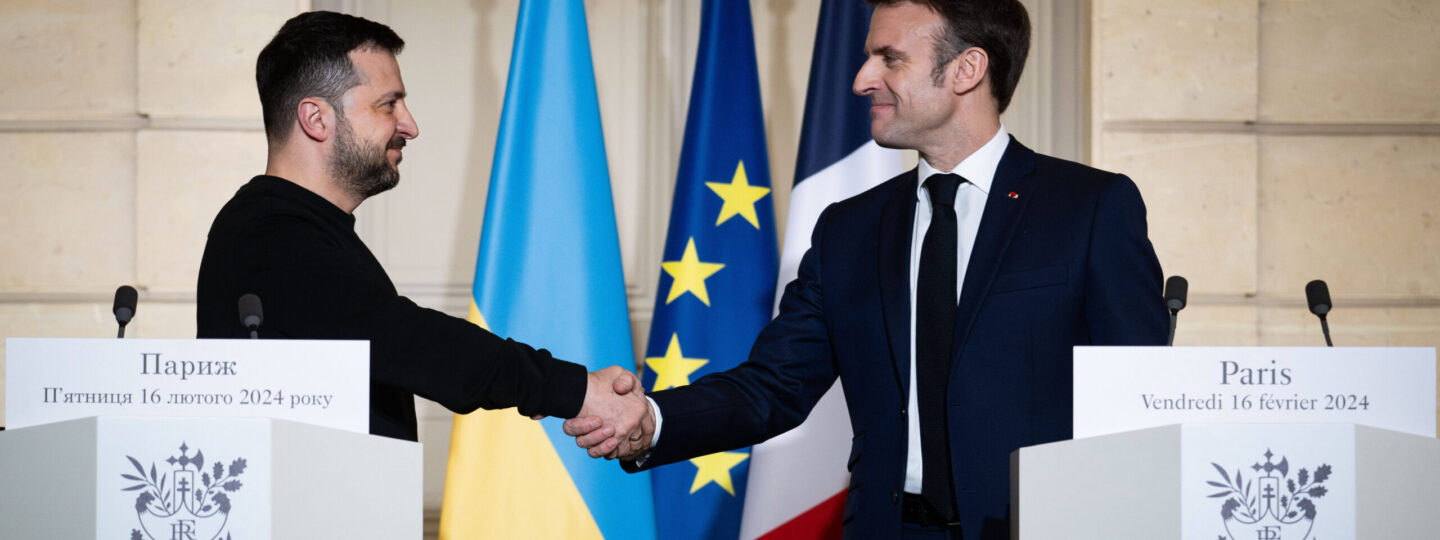International
French President Macron sends military agreement between France and Ukraine to parliament

In the French parliament, we have today the start of debates on the bilateral security agreement between France and Ukraine, with members of parliament set to vote on the text this Tuesday afternoon and senators due to speak tomorrow.
France and Ukraine signed this bilateral agreement on February 16; however, before it can be ratified, Parliament must now vote on the specifics of the agreement.
What does the agreement contain?
Concluded for a period of ten years, the Franco-Ukrainian agreement “is valid as long as Ukraine has not joined NATO,” according to the government website. The agreement “underlines France’s willingness to support Ukraine with specific commitments in the military and civilian fields.”. This includes the dispatch of 3 billion euros in additional military aid for its Ukrainian ally.
Is Macron planning to send troops to Ukraine?
Emmanuel Macron’s brief statement from February 26 continues to spark discussions in France. The president reaffirmed that he would set “no limits” on aid to Kiev and said that sending ground troops “should not be excluded,” a statement that caused considerable concern. But the text submitted to Parliament this week makes no mention of sending troops to the front and merely outlines the contours of more substantial aid.
Evidently, the president and his government did not see fit to throw gasoline on the fire at this stage, but the option remains open for the future.
When will the French parliament vote?
The National Assembly’s deputies will study the text starting at 3 p.m. on Tuesday, March 12, and then the senators will vote on it at 6:15 p.m. on Wednesday, March 13. But the vote is purely symbolic and non-binding for the government. It will have no impact on the agreement signed with Kiev.
Why is this agreement the focus of so much debate?
The government has made clear its desire to deepen military cooperation with Ukraine. The Prime Minister even used it as an electoral argument, in the middle of a rally for the European elections. “For the RN, in the face of Russia, any softness, any weakness is good,” he said. “Ambiguous” about Russia? The RN, like LFI, are eagerly awaited at the turn, as a Macronie executive revealed to AFP. “Either way, the vote will be very close because LFI and RN will vote against it. Or the vote will be very broad because the same people will abstain,” he predicts.
These two parties have recently made it clear that there is a red line that could make them vote against the text: the prospect of Ukraine joining NATO. Such membership would also be “a provocation” for Communist Party national secretary Fabien Roussel.
The PS-Place publique alliance hails the debate as “useful” for future security and peace in Europe. Raphaël Glucksman, head of the PS list for the European elections, called on all left-wing forces to vote in favor of the text.
On the Republican side, the outcome of the vote is more uncertain. “I reiterated the Republicans’ total support for Ukraine, for financial aid and military equipment. But I reiterated our total opposition to a commitment of ground troops. It’s an inappropriate and irresponsible position,” said Eric Ciotti, President of the French Republicans, ahead of the vote.
How the opposition RN and LFI will vote
Members of the Rassemblement National (center-rightward opposition) will abstain from the vote. The RN is “in favor of supporting Ukraine” but “does not wish to go to war with Russia,” explained RN President Jordan Bardella on France 2 this morning. The MEP believes that “the path Emmanuel Macron is on” is “totally irresponsible.”. On February 27, at the end of a conference in support of Ukraine, the French President said that sending Western troops on the ground should not be ruled out in the future. Jordan Bardella adds that certain points in the agreement constitute “red lines,” such as the prospect of Ukraine joining the European Union and NATO. “Any form of enlargement could increase the risk of escalation,” he denounced.
La France insoumise (far-left opposition) sets the same red lines. The group will vote against it. Invited by LCI, Manuel Bompard, coordinator of France Insoumise, also pinpointed French support for Ukraine’s future membership in the EU and NATO. “From the moment there are these red lines, I don’t see how we can vote positively this afternoon on this agreement,” he predicted. Encouraging his colleagues to “oppose” the text, Manuel Bompard also described the vote as “a masquerade.”. “In actuality, the President of the Republic has already ratified the bilateral agreement between France and Ukraine, even though officially we are supposed to be voting on it.”






